Email remains a critical tool for communication and organization, and for iOS users, selecting the right email app is essential to boost productivity and efficiency. In this comprehensive guide, we explore the best email apps available on iOS in 2025. Whether you are managing multiple accounts or seeking advanced security features, our guide is designed for experienced users looking to optimize their email workflow. Let us walk you through in-depth reviews, advanced features, and practical tips that will help you make an informed decision.
Why Choosing the Right Email App Matters
In today’s digital landscape, email is more than just a method of communication, it is a central hub for managing work, personal correspondence, and important notifications. The right email app can streamline your daily routines, reduce clutter, and ensure that you never miss an important message.
When you have multiple email accounts or need to integrate your inbox with other productivity tools, the app you choose can directly impact your efficiency and stress levels. A well-designed email app provides intuitive organization, smart filtering, and even AI-powered features that can help you prioritize and manage your messages effectively.
Understanding Email Productivity
Imagine your email inbox as a busy highway during rush hour. Without proper management, important messages can get lost in the traffic. A robust email app acts like a well-organized traffic control system, ensuring that every message reaches its destination and gets the attention it deserves. By leveraging advanced filtering, smart categorization, and AI-driven features, you can transform your email routine into a highly productive process.
For example, features such as smart inboxes and automatic labeling help to separate high-priority emails from routine notifications. This not only saves time but also minimizes distractions, allowing you to focus on what truly matters. As an experienced iOS user, you are already aware that a cluttered inbox can lead to missed opportunities and increased stress. Investing in an email app with advanced productivity features can make a significant difference in your day-to-day operations.
Impact on Personal and Professional Communication
Efficient email management is essential for both personal and professional communication. Whether you are coordinating with colleagues, scheduling appointments, or handling customer inquiries, the email app you use plays a pivotal role in maintaining smooth and timely communication.
For professionals, a feature-rich email app can integrate seamlessly with other productivity tools like calendars, cloud storage, and task management platforms. This integration creates a unified ecosystem where you can manage your work from a single interface, eliminating the need to switch between multiple applications. On the personal front, an organized email system helps in managing subscriptions, personal messages, and even social notifications without overwhelming you.
Moreover, the right email app can provide enhanced security features, ensuring that your private and sensitive information remains protected. With data breaches and privacy concerns becoming more prevalent, choosing an email app that prioritizes security is more critical than ever.
Top iOS Email Clients for Enhanced Productivity
There is a wide array of email apps available on iOS, each with unique strengths and capabilities. In this section, we will delve into the features and benefits of the most popular email apps, including both native and third-party options. Our goal is to provide you with the insights needed to choose an app that best meets your specific requirements.
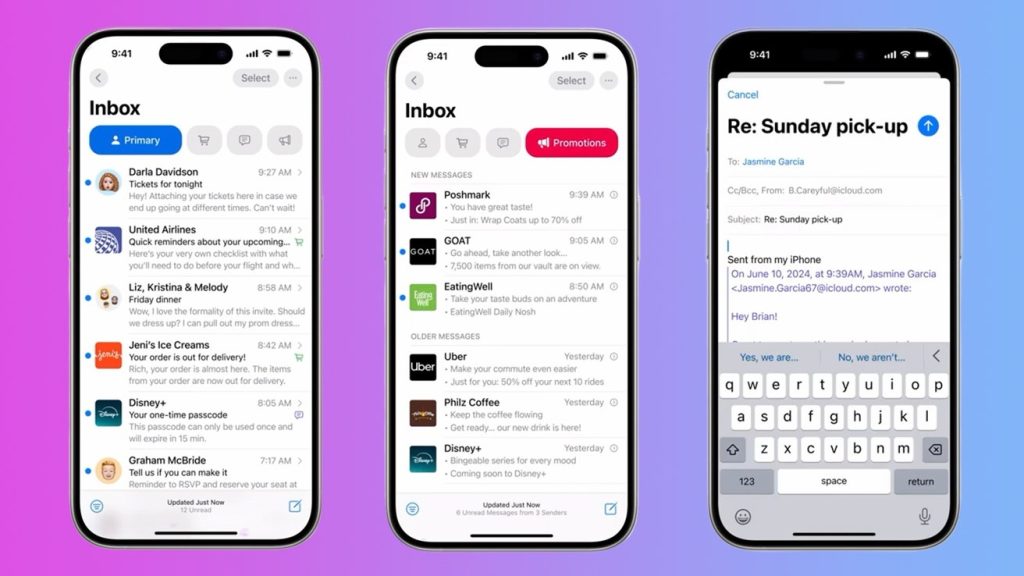
Apple Mail: The Native Option
Apple Mail comes pre-installed on every iOS device and offers a familiar interface along with reliable performance. Its deep integration with the iOS ecosystem makes it a convenient choice for many users. The app is designed to work seamlessly with other Apple services, ensuring smooth synchronization across devices.
Apple Mail focuses on simplicity and ease of use. Its features include VIP inbox filtering, which helps you prioritize emails from key contacts, and Mail Privacy Protection, which safeguards your data from unwanted tracking. However, while its core functionalities are robust, some users find its feature set somewhat basic compared to more specialized alternatives.
The app supports major email protocols such as IMAP and SMTP, but its lack of POP support may be a limitation for certain users. Overall, if you prefer an app that is straightforward and well-integrated with your iOS device, Apple Mail remains a strong option.
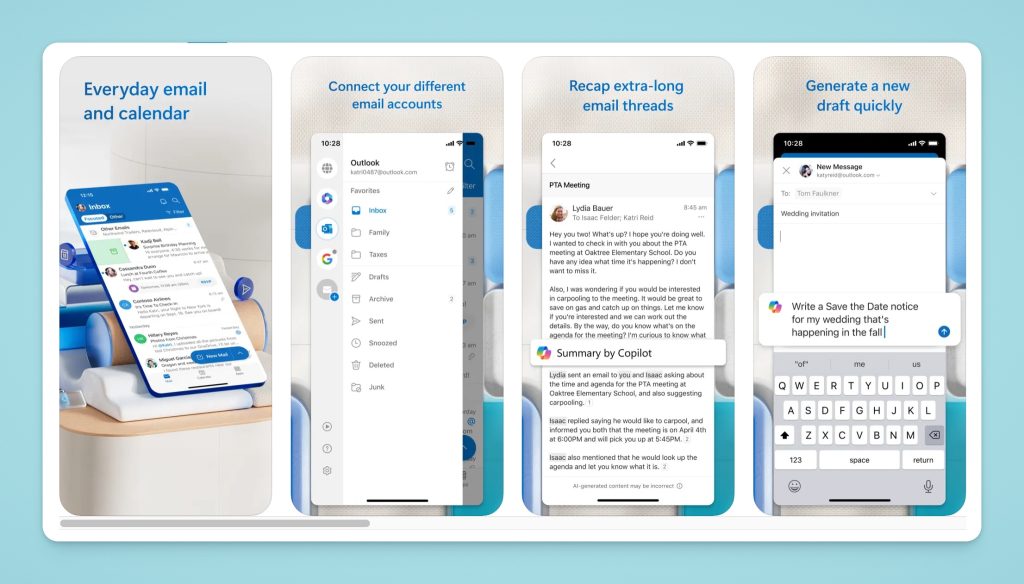
Microsoft Outlook: A Powerhouse for Professionals
For those seeking a more feature-rich email solution, Microsoft Outlook stands out as a leader in email productivity. Outlook offers a smart inbox that intelligently separates important messages from less urgent ones, ensuring that you stay focused on what matters most. Its integration with Microsoft’s suite of productivity tools, including OneDrive and Outlook Calendar, makes it especially appealing for business professionals.
Outlook’s smart organization capabilities extend to its AI-powered features. With tools such as Microsoft Copilot Pro, the app can offer context-aware suggestions and automate routine tasks, further enhancing your email experience. While the app is free for basic use, premium features and additional storage options are available through a subscription model.
For professionals embedded in the Microsoft ecosystem, Outlook not only serves as an email client but also as a comprehensive productivity hub. Its seamless integration with Office 365 applications allows for a unified workflow, which is invaluable for managing both emails and collaborative projects.
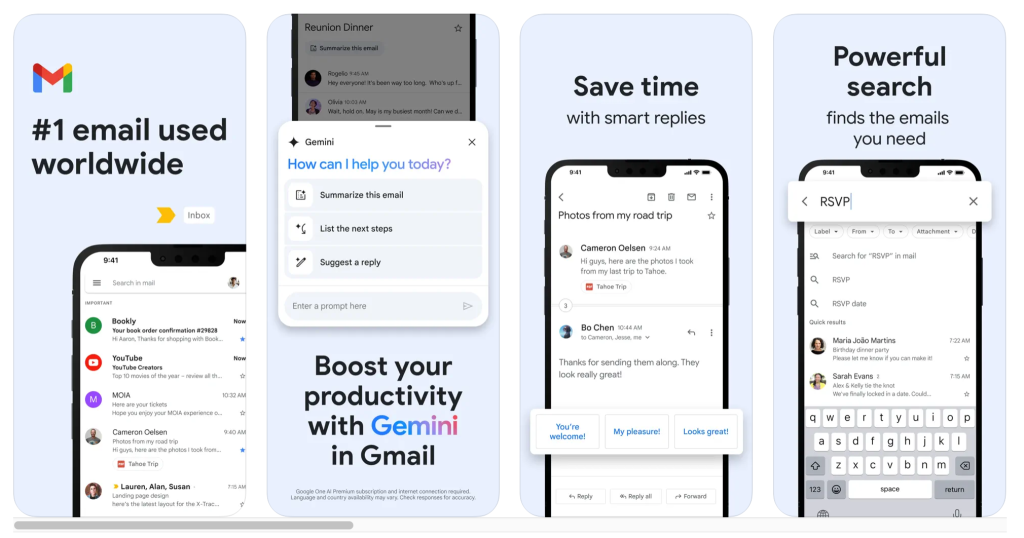
Gmail: Seamless Integration with the Google Ecosystem
Gmail is renowned for its advanced organization tools and AI-driven features. With over a decade of development behind it, Gmail offers features such as Smart Compose and Smart Reply, which harness machine learning to provide personalized suggestions while you write. This helps in drafting responses quickly and efficiently without compromising on quality.
The app automatically categorizes emails into various tabs, such as Primary, Social, and Promotions, making it easier to navigate a busy inbox. For users who rely heavily on Google services, Gmail integrates flawlessly with Google Calendar, Google Drive, and other tools within the ecosystem, creating a cohesive digital workspace.
While Gmail is free to use, it does collect certain usage data to personalize your experience. Despite this, its robust feature set, combined with constant updates and improvements, has kept Gmail at the forefront of email clients for iOS users looking for advanced functionality.
Specialized Email Apps
Beyond the mainstream options, there are several specialized email apps that cater to niche needs. These apps are designed to address specific pain points, such as advanced inbox management, team collaboration, customization, or enhanced security.
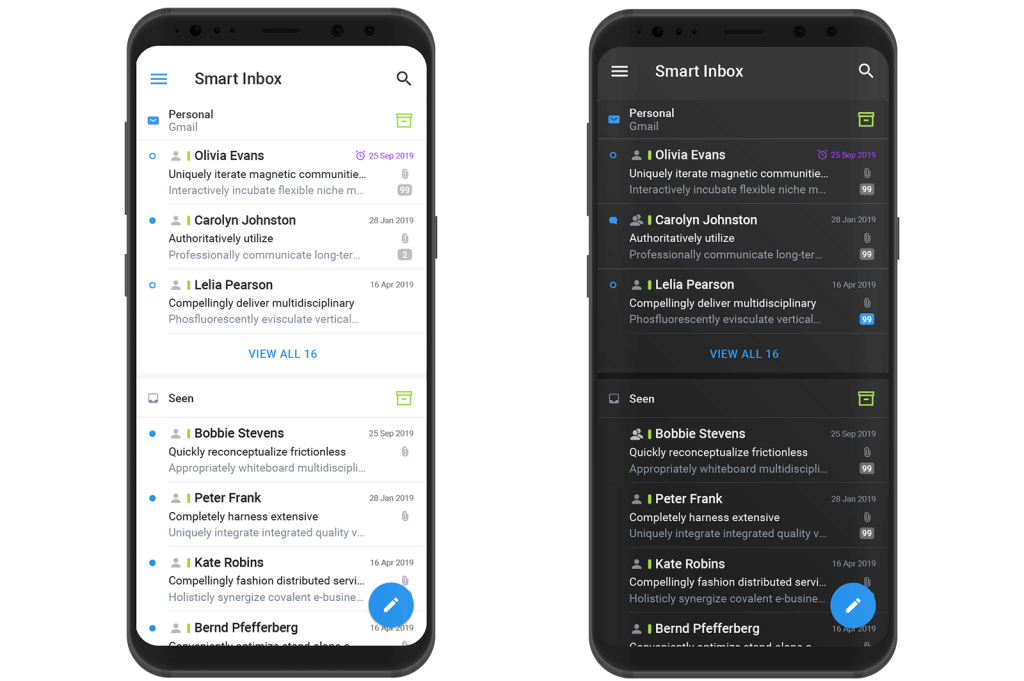
Spark: Best for Team Collaboration
Spark has gained popularity for its emphasis on teamwork and collaborative features. Its clean, intuitive interface is complemented by powerful organization tools that allow you to manage emails collaboratively with your team. Spark includes features like shared drafts, team comments, and collaborative inboxes, which are particularly useful in a business setting.
The app also integrates with various productivity tools, making it easier to manage tasks directly from your inbox. Its AI-powered features, dubbed as “Magic” tools, further streamline email composition and reply processes. For professionals who require a balance between personal email management and team collaboration, Spark presents a compelling option.
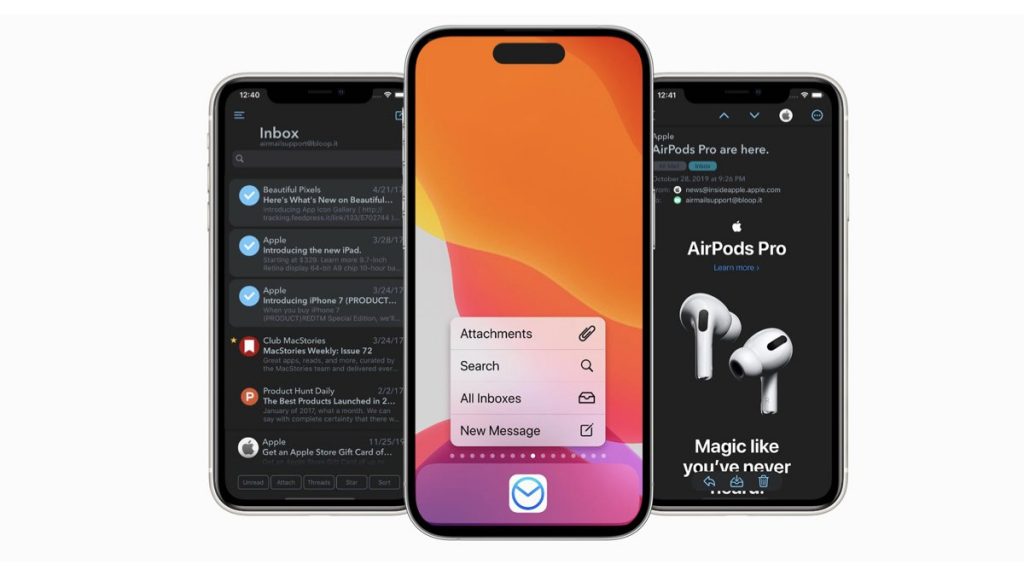
Airmail: Best for Customization
For users who demand a high degree of customization in their email workflow, Airmail offers extensive flexibility. With features such as custom actions and workflows, Airmail lets you tailor the app to suit your personal or professional needs. You can set up automated sequences for common tasks, such as moving emails to specific folders or triggering pre-written responses.
Airmail’s integration with cloud storage services, calendars, and even to-do lists makes it a versatile tool for managing both email and daily tasks. The interface is designed for those who appreciate control over every aspect of their digital communication, and its extensive settings cater to users who want to create a bespoke email experience.
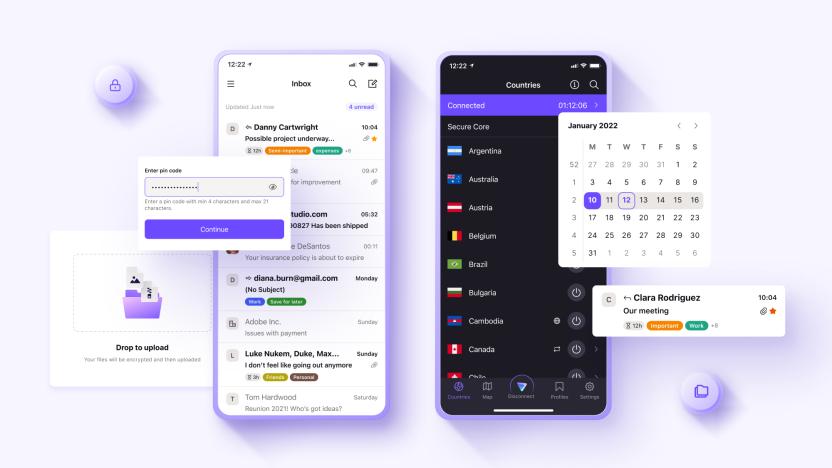
ProtonMail: Best for Security
In an era where data privacy is paramount, ProtonMail stands out for its unwavering commitment to security. With end-to-end encryption built into its core, ProtonMail ensures that your emails remain confidential, even from the service provider. This level of security is particularly important for professionals handling sensitive information.
While ProtonMail may lack some of the advanced organizational features of other apps, its focus on privacy and data protection makes it an ideal choice for security-conscious users. The app is available in both free and premium versions, offering scalable solutions depending on your storage and feature requirements.
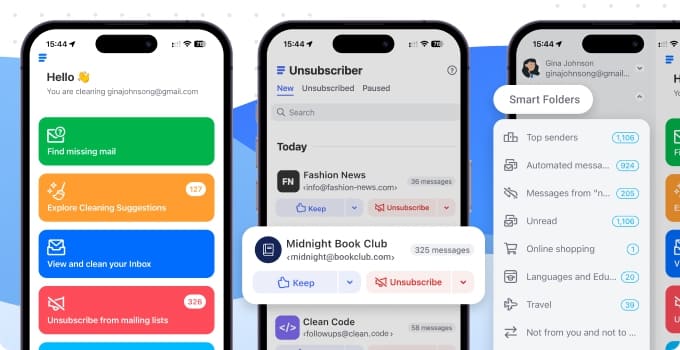
Clean Email: Best for Inbox Management
Clean Email focuses on simplifying the chaos of an overloaded inbox. It offers automated cleaning suggestions, smart folders, and an unsubscriber feature that helps you regain control over your email flow. The app’s interface is designed to help you quickly identify and eliminate clutter, making it easier to focus on important messages.
Its commitment to privacy is also notable, Clean Email does not collect or sell user data, making it a trustworthy option for those concerned with data security. Whether you are managing personal correspondence or professional communications, Clean Email offers a robust solution for maintaining an organized inbox.
Advanced Features to Look For in iOS Email Apps
As email apps evolve, advanced features are increasingly shaping the user experience. When evaluating your options, consider the following capabilities that can significantly enhance your workflow and overall productivity.
Smart Organization and Filtering
One of the standout features of modern email apps is the ability to organize and filter your messages intelligently. Smart organization tools automatically sort your emails into categories, such as primary messages, promotions, and social notifications. This allows you to focus on high-priority emails without getting distracted by less important content.
Features like smart inboxes, custom labels, and dynamic filters can drastically reduce the time you spend searching for specific messages. By leveraging these tools, you can set up a system that prioritizes your workload, ensuring that urgent emails are brought to your attention immediately. In practice, this means that even if you receive hundreds of emails per day, your inbox remains manageable and efficient.
Multi-Account and Cross-Platform Support
For many iOS users, managing multiple email accounts is a necessity rather than a luxury. Whether you have separate accounts for work, personal use, or even niche projects, an ideal email app should provide seamless multi-account support. This ensures that you can switch between accounts effortlessly, without the hassle of logging in and out repeatedly.
Cross-platform compatibility is another essential factor. If you use your iPhone, iPad, or even a desktop computer, the email app should sync across devices without any data loss or disruption. This cross-platform support not only improves convenience but also ensures that you have access to your communications wherever you are.
Privacy and Security
Privacy concerns have taken center stage in digital communication, and email apps are no exception. With data breaches becoming all too common, the security features of an email client are a major consideration. Look for apps that offer end-to-end encryption, secure data storage, and robust privacy policies. Features like Mail Privacy Protection and built-in encryption are invaluable for safeguarding sensitive information.
For professionals handling confidential data, an email app that emphasizes security is not just a bonus, it is a necessity. Whether you are sending proprietary business information or personal data, knowing that your communications are protected can provide peace of mind. Evaluating an app’s privacy policy and user reviews can help you determine if it meets your security standards.
AI Enhancements and Automation
Artificial intelligence has revolutionized many aspects of digital communication, and email apps are no exception. AI-powered features like Smart Compose, Smart Reply, and automated sorting can transform the way you manage your inbox. These enhancements not only save time but also reduce the cognitive load of composing repetitive messages.
Automation tools can help with tasks such as scheduling emails, setting reminders, and even drafting responses based on previous interactions. By integrating AI into your email routine, you can focus more on high-level strategic tasks rather than getting bogged down in administrative details. For users who value efficiency and innovation, AI enhancements represent a major step forward in email management.
Practical Tips for Optimizing Your Email Workflow on iOS
Even the best email app can only take you so far without the right strategies in place. Optimizing your email workflow involves adopting best practices that help you stay organized, reduce distractions, and make the most of the advanced features available.
Customizing Notifications and Alerts
One of the most effective ways to manage your email is by customizing notifications and alerts. Not every email requires an immediate response, and receiving notifications for every new message can quickly become overwhelming. Consider adjusting the notification settings in your email app so that you only receive alerts for messages from key contacts or those marked as important.
By tailoring your notifications, you can maintain focus on critical tasks while minimizing disruptions. Experiment with different alert tones, vibration patterns, or even scheduled quiet hours to see what best suits your workflow. A more mindful approach to notifications can significantly boost your productivity over time.
Leveraging Built-In Tools and Integrations
Modern email apps often come with a host of built-in tools and integrations that extend far beyond simple messaging. Many apps offer calendar integration, cloud storage access, and even direct links to productivity tools like task managers or note-taking apps. These features can help you create a seamless workflow where all aspects of your day are interconnected.
For instance, if you frequently schedule meetings via email, look for an app that syncs directly with your calendar. If managing attachments and files is a priority, consider one that integrates smoothly with popular cloud storage services. These integrations not only save time but also enhance the overall efficiency of your email management.
Organizing Your Inbox for Maximum Efficiency
A well-organized inbox is the cornerstone of efficient email management. Over time, even a minor misstep in organization can lead to a cluttered and unmanageable inbox. Establish a consistent system for organizing emails by using folders, labels, or categories. Many modern apps allow you to automate parts of this process by setting up rules or filters that move emails into specific folders based on criteria you define.
Regularly archiving or deleting unnecessary emails can also keep your inbox lean and focused. Experiment with techniques such as the “zero inbox” method, which encourages you to clear your inbox at the end of each day. By implementing a systematic approach to organization, you ensure that only the most relevant emails demand your attention.
Integrating with Other Productivity Apps
Your email app does not have to work in isolation. In fact, the most efficient workflows are built on the seamless integration of various productivity tools. Many email clients allow you to connect with apps for project management, note-taking, and even instant messaging. This integration can turn your email app into a central hub for all your communications and tasks.
For example, if you use a task management tool like Trello or Asana, you can often integrate these with your email app to create tasks directly from your inbox. Similarly, linking your email with cloud-based document services can simplify file sharing and collaboration. This holistic approach not only streamlines your workflow but also saves you from having to jump between multiple applications throughout the day.
Comparison and Recommendations
With so many options available, it can be challenging to decide which email app best suits your needs. Let’s take a closer look at how the leading apps compare based on key factors such as interface design, organizational tools, security features, and pricing.
User Interface and Experience
- Apple Mail: Offers a clean, minimalist design with straightforward navigation. It is perfect for users who value simplicity and integration with iOS but may lack advanced customization.
- Microsoft Outlook: Provides a modern interface enriched with a smart inbox and calendar integration, making it ideal for busy professionals who require a comprehensive productivity suite.
- Gmail: Features a dynamic, AI-enhanced interface that categorizes emails automatically, which is particularly useful for users managing large volumes of messages.
- Specialized Apps (Spark, Airmail, ProtonMail, Clean Email):
- Spark stands out with its collaborative tools and team-oriented features.
- Airmail offers extensive customization for users who want to fine-tune every aspect of their workflow.
- ProtonMail is the leader in privacy and security, while
- Clean Email excels in inbox decluttering and organization.
Organization and Productivity
Each email client employs unique strategies to help you manage your inbox efficiently:
- Smart Filtering: Gmail and Outlook lead with AI-powered smart filtering, ensuring that only the most critical emails capture your attention.
- Automation: Airmail and Spark incorporate automation features that help streamline repetitive tasks, allowing you to focus on strategic activities.
- Customization: If you need a highly tailored email experience, Airmail’s custom workflows provide the flexibility to design an inbox that works the way you want it to.
Privacy and Security
Security is paramount when it comes to handling sensitive information:
- ProtonMail offers industry-leading end-to-end encryption, making it the best choice for users prioritizing privacy.
- Apple Mail and Outlook include features like Mail Privacy Protection and secure data handling, though they may not provide the same level of encryption as ProtonMail.
- Gmail is a powerful tool for productivity, but some users have concerns over data tracking and privacy.
Pricing Structure
Most email apps offer a free version with the option to upgrade for premium features:
- Apple Mail, Gmail, and Outlook provide robust free versions, with premium features accessible via subscriptions for users needing additional storage or advanced features.
- Specialized Apps:
- Airmail offers both free and subscription-based models for advanced customization,
- ProtonMail provides free usage with the option to upgrade for enhanced security and additional storage, and
- Clean Email offers tiered pricing based on mailbox size and feature set.
Recommendations Based on User Profiles
- For the Everyday User:
If you prefer a familiar, straightforward interface and deep integration with your iOS device, Apple Mail is an excellent choice. It provides all the essentials without overwhelming you with options. - For Business Professionals:
Microsoft Outlook is tailored for those who need a unified productivity platform. Its smart inbox, calendar integration, and AI enhancements make it ideal for managing a busy schedule. - For the Google Enthusiast:
Gmail’s AI features and seamless integration with Google’s ecosystem make it the best option for users already invested in Google services. - For Security-Conscious Users:
ProtonMail is the preferred choice if end-to-end encryption and data privacy are your highest priorities. - For the Power User:
If you require extensive customization and advanced workflow automation, consider Airmail or Spark for their robust features that adapt to complex email management needs.
Conclusion
Choosing the right email app on iOS in 2025 can transform how you manage your communications, improve productivity, and protect your sensitive data. Whether you lean toward the simplicity of Apple Mail, the robust productivity features of Microsoft Outlook, or the advanced AI and integration capabilities of Gmail, there is an option tailored to your needs. Specialized apps like Spark, Airmail, ProtonMail, and Clean Email further illustrate that there is no one-size-fits-all solution, your choice should reflect your personal and professional priorities.
What factors should I consider when choosing an iOS email app?
When choosing an email app, consider its integration capabilities, ease of use, advanced features like AI enhancements, security measures, and support for multiple accounts. A balanced mix of these factors will ensure a smooth email management experience.
How do advanced AI features enhance email productivity?
Advanced AI features such as Smart Compose, automated filtering, and intelligent prioritization help reduce the time spent on routine tasks. These tools can draft responses, sort emails by importance, and streamline your workflow, allowing you to focus on strategic communications.
Can I manage multiple email accounts with these apps?
Yes, most modern email apps, including Outlook, Gmail, and specialized apps like Airmail, support multiple email accounts. This feature is especially useful if you separate your work, personal, and other email communications into different accounts.
Which email app offers the best security features?
ProtonMail is renowned for its robust end-to-end encryption, making it an ideal choice for users who prioritize security. However, other apps like Apple Mail and Outlook also offer strong privacy protections with features like Mail Privacy Protection.
How can I integrate my email app with other productivity tools?
Many email apps offer built-in integrations with calendars, cloud storage services, and task management tools. For example, Outlook integrates with Microsoft’s suite, while Gmail connects seamlessly with Google’s services. Additionally, apps like Airmail allow you to customize workflows by integrating with third-party productivity platforms.
As email continues to evolve, integrating advanced features such as smart organization, multi-account support, and AI enhancements will only become more important. We encourage you to assess your needs, experiment with different tools, and ultimately select the email app that complements your workflow best.
